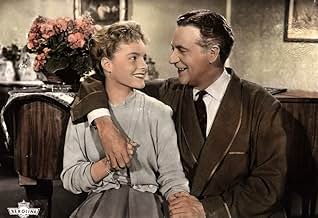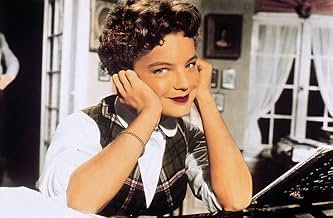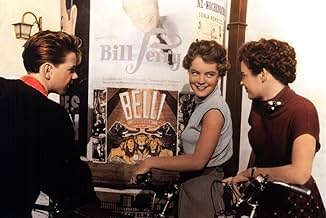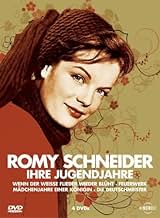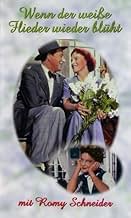Ajouter une intrigue dans votre langueMarried couple Willy and Therese go separate ways. Willy leaves town and returns years later as a famous singer. But Therese is about to marry her best friend Peter. Little does Willy know t... Tout lireMarried couple Willy and Therese go separate ways. Willy leaves town and returns years later as a famous singer. But Therese is about to marry her best friend Peter. Little does Willy know that he and Therese have a now teen-aged daughter.Married couple Willy and Therese go separate ways. Willy leaves town and returns years later as a famous singer. But Therese is about to marry her best friend Peter. Little does Willy know that he and Therese have a now teen-aged daughter.
- Director
- Writers
- Stars
- Evchen Forster
- (as Romy Schneider-Albach)
- Solotänzer
- (as Jockl Stahl)
- Baumgartner
- (uncredited)
Avis en vedette
The whole storyline with more or less convincing aspects could be described as 'torments of a couple that cannot stand each other's differences and remain separated as long as someone important appears in between them and leads towards happy ending' Quite many lacks in character development and some inconsistencies of continuity. And yet, WHEN WHITE LILACS BLOOM AGAIN is a movie that appears to be highly worth seeing and remains a milestone of German post war cinema...
Perhaps, it would be forgotten today if it did not play a significant role in the career of one actress who, perhaps after Marlene Dietrich and Hildegard Knef, was the most successful German speaking actress in the history of cinema. Directed by Hans Deppe, it is a film where a great German star of the pre-war period, Magda Schneider, along with other celebrities of the time, introduces her child, Rosemarie Retty Albach (later known to the world as ROMY SCHNEIDER), to the industry. 15 year-old Rosemarie, by meeting the director Hans Deppe in Munich, takes her best chance to get what she had dreamed of ever since she was small: career as an actress. It is a joy to see young, unfocused and still inexperienced Romy in the role of Evchen, a girl who at last discovers who her father is. What may occur more captivating and more memorable than the debut?
The very first time? In her diary, Romy herself mentioned her surprising encounter with the medium and generally with the work of an actress, a job she had always dreamed of. As a kid, she had imagined it differently and the autumn of 1953 brought the reality in full. Having left the boarding school at Goldenstein and the still idyllic Bavaria, she was surprised with Cologne (with war destruction) and the techniques of acting before a camera. Director Deppe reduced the fear in a young actress and helped her handle the performance (the note in Romy's diary says that he kept saying: 'Don't look at the camera'). But what was perfect for the young girl with unbelievable talent was the role itself: she is not a princess from some distant world but a simple girl, a daughter of a famous father but with a pack of friends who keep her company. Moreover, she plays a very young person whose lines carry resemblance in the actress's real life. Her mum, Magda, is also her mum in the movie (like it is the case with later SISSI Trilogy). And the scenes...
...there are many sweet scenes that young Rosemarie makes charming and special. The fresh performance with lots of youthful enthusiasm and beauty makes the moments vibrant and lively. She clearly feels comfortable playing with her mother than with other cast but, generally, she creates a unique atmosphere throughout with the climax of the song being sung together with her famous daddy. Most memorably, she utters "Himmlisch" (heavenly) while her friend utters 'uebererdisch' (unearthly). Therefore, if there is a constructive criticism which addresses this movie, it surely fails in case of Romy Schneider - she is the ultimate plus of this film.
Magda Schneider as Therese Forster crafts her 1930s scenes that recall a pleasant comedy, EVA (1935), in particular. The scene when her husband is singing his dedication to her is a clear reference to the appealing style that the viewers of the time were used to. Ms Schneider is unforgettable in the scene when a very special song is being played on the radio, the song that gives an answer to her dilemmas. Also, her meaningful tears in the theater and visual attention being caught remain a unique impact of a classical actress on her audience... Willy Fritsch is adequate in the role but not outstanding. It is hard to play a famous person whose attention, in a long run, is stolen by the younger and more attractive. Besides, the script itself makes it difficult for the actor to feel at ease. Among the supporting cast, Paul Klinger's role of uncle Peter deserves attention.
Kept in the style of a musical movie, it offers some truly musical moments that maintain the charm of the time. The songs are sweet but fit well to the genre. The spots are authentic, in particular, the ones shot on location at Wiesbaden (not so common for Heimatfilme). Besides, the images of spring and the title lilacs provide mood which consoled the viewers of the time and, symbolically, directed their impressions towards hopeful future. And for us now?
For us today, it is purely a Romy Schneider film more significant 30 years after her death. The very first movie when all white lilacs bloomed for her approaching career.
The beginning of the movie is really stupid: a woman is married to a professional singer and divorces him because he sang a love-song looking to another woman in the audience. For the people who keep watching after this scene, there is a nice hour of movie-watching coming.
Sixteen years later. The divorced woman's daughter falls for a singer. The movie is about how everybody reacts upon her crush. It is a sunny story with songs that stay with you all day. The characters are friendly and all persons react really logical on the events.
I hope more people watch this, and become to like it.
The film is also notable for the acting of two characters. The actress Romy Schneider, here in an important supporting role, would later come to be one of Germany's best-loved actresses, for example when she played the title role in Sissi. But most interesting was the actress who played Willy's manager, who I think must be Ellen (Hertha Feiler), who adopts a deliberately "modern" style, and is largely responsible for frustrating the ending one might have expected.
Le saviez-vous
- AnecdotesFilm debut of Romy Schneider and Götz George.
- Citations
Peter Schroeder: I don't like you at all lately. Maybe you should go see a doctor and he could prescribe you something. You know, for strength. My mother always got malt extract.
Therese Forster: I have seen a doctor.
Peter Schroeder: What, you have seen a doctor? Why? Is something wrong?
Therese Forster: No, it's nothing.
Peter Schroeder: Come on, don't fool me. Something is wrong there. One does not go to see a doctor for no reason. Does anything hurt, Therese?
Therese Forster: [pats his hand] Don't worry. I am absolutely healthy.
Peter Schroeder: [hurt] Alright, if you don't want to tell me, if you don't trust me, I can't force you. I thought I'm your friend.
Therese Forster: But Peter... I didn't know you're so dumb. Why does a healthy woman go see a doctor?
- ConnexionsFeatured in Romy, femme libre (2022)
- Bandes originalesWenn der weiße Flieder wieder blüht
(Vill ni se en stjärna)
Music by Franz Doelle
Performed by Zarah Leander & Liane Augustin
Meilleurs choix
Détails
- Date de sortie
- Pays d’origine
- Langue
- Aussi connu sous le nom de
- When the White Lilacs Bloom Again
- Lieux de tournage
- Bergkirche, Wiesbaden, Hessen, Allemagne(the church with the wedding announcement)
- société de production
- Consultez plus de crédits d'entreprise sur IMDbPro
Contribuer à cette page


